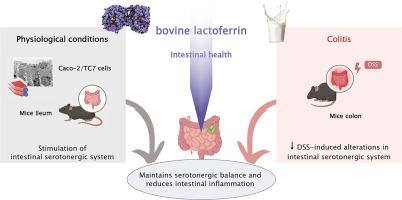Protective role of bovine lactoferrin in modulating the intestinal serotonergic system: Implications in intestinal inflammation
IF 4.9
2区 医学
Q1 BIOCHEMISTRY & MOLECULAR BIOLOGY
引用次数: 0
Abstract
Bovine lactoferrin (bLf) is a multifunctional milk glycoprotein with diverse biological activities pivotal for gastrointestinal health. This study investigates the modulatory effects of bLf on the intestinal serotonergic system and its implications for intestinal inflammation and homeostasis. Intestinal serotonergic system plays a critical role in gut homeostasis, regulating various physiological processes via serotonin (5-HT) signaling. Dysregulation of this system contributes to inflammatory bowel diseases, characterized by chronic inflammation and disrupted intestinal function. We evaluated the impact of bLf on the intestinal serotonergic system in vitro and in vivo. In Caco-2/TC7 cells, bLf treatment enhanced serotonin transporter (SERT) activity and mRNA expression and modulated the mRNA levels of several serotonin receptors (5-HTRs). In mice, oral bLf administration upregulated SERT, tryptophan hydroxylase 2 (TPH2), and 5-HTRs mRNA expression in the ileum. Moreover, in a dextran sodium sulphate (DSS)-induced colitis model, bLf attenuated clinical signs of colonic inflammation, while normalizing the mRNA expression of SERT, TPH1, TPH2, and 5-HTRs in colon. These findings highlight the ability of bLf to modulate key components of the intestinal serotonergic system under both physiological and inflammatory conditions. Given the leading role of serotonin in gut-brain axis and immune regulation, bLf emerges as a promising functional food ingredient with potential for preventing or managing intestinal inflammation. Further exploration of its dietary applications may support the development of innovative nutritional strategies targeting gut-related disorders.

牛乳铁蛋白在调节肠道血清素能系统中的保护作用:在肠道炎症中的意义。
牛乳铁蛋白(bLf)是一种多功能乳糖蛋白,具有多种生物活性,对胃肠道健康至关重要。本研究探讨了bLf对肠道血清素能系统的调节作用及其对肠道炎症和体内平衡的影响。肠道5-羟色胺能系统通过5-羟色胺(5-HT)信号传导调节肠道内各种生理过程,在肠道内稳态中起关键作用。该系统的失调会导致炎症性肠病,其特征是慢性炎症和肠道功能紊乱。我们在体外和体内评估了bLf对肠道血清素能系统的影响。在Caco-2/TC7细胞中,bLf处理增强了血清素转运体(SERT)活性和mRNA表达,并调节了几种血清素受体(5- hts)的mRNA水平。在小鼠中,口服bLf可上调回肠SERT、色氨酸羟化酶2 (TPH2)和5- hts mRNA的表达。此外,在葡聚糖硫酸钠(DSS)诱导的结肠炎模型中,bLf减轻了结肠炎症的临床症状,同时使结肠中SERT、TPH1、TPH2和5- hts的mRNA表达正常化。这些发现强调了bLf在生理和炎症条件下调节肠道血清素能系统关键成分的能力。鉴于血清素在肠脑轴和免疫调节中的主导作用,bLf成为一种有前景的功能性食品成分,具有预防或控制肠道炎症的潜力。对其饮食应用的进一步探索可能支持针对肠道相关疾病的创新营养策略的发展。
本文章由计算机程序翻译,如有差异,请以英文原文为准。
求助全文
约1分钟内获得全文
求助全文
来源期刊

Journal of Nutritional Biochemistry
医学-生化与分子生物学
CiteScore
9.50
自引率
3.60%
发文量
237
审稿时长
68 days
期刊介绍:
Devoted to advancements in nutritional sciences, The Journal of Nutritional Biochemistry presents experimental nutrition research as it relates to: biochemistry, molecular biology, toxicology, or physiology.
Rigorous reviews by an international editorial board of distinguished scientists ensure publication of the most current and key research being conducted in nutrition at the cellular, animal and human level. In addition to its monthly features of critical reviews and research articles, The Journal of Nutritional Biochemistry also periodically publishes emerging issues, experimental methods, and other types of articles.
 求助内容:
求助内容: 应助结果提醒方式:
应助结果提醒方式:


